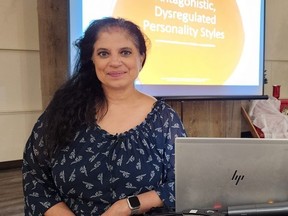
Aiming to give clinicians the tools they need to tackle the widespread issue, a Los Angeles-based psychologist believes a multi-faceted approach is the most effective way to help people beat addictions.
Advertisement 2
Article content
Dr. Ramani Durvasula was guest speaker for this year’s Chatham-Kent Addictions Awareness Conference at the Everest Convention Center.
Article content
The theme was Addiction and Antagonism: Accounting for Narcissism in the Treatment of Addictions.
Durvasula focuses her work on the impact of narcissism, particularly high-conflict, entitled and antagonistic personalities, on relationships, mental health and society in general.
Like homebuyers who focus on windows, interiors and other features instead checking foundations, clinicians assessing addicted clients often focus on the most problematic symptoms, she said.
“We really need to talk about personality, specifically maladaptive personality, to understand other things that might be contributing to (addiction),” Durvasula said during a break in the conference.
Advertisement 3
Article content
During her presentation, Durvasula offered an overview of various personality styles and best practices for treatment.
Personality can be described as the “constant backbeat that plays in the symphony” of a person’s life, she said.
“We can understand how that person will cope with adversity, their levels of resilience, how they’ll show up in relationships,” she said. “By understanding all of that, we can inform long-term treatment for chronic issues, such as addictions.”
Helping someone with sobriety is only part of the healing, she stressed, adding that relapse isn’t failure, but an opportunity to learn.
“Recovery is actually about sort of this full change in the person,” she said. “How they view others. How they view themselves. How they cope with stress.
Advertisement 4
Article content
“The research is very clear that addiction treatment has to be multimodal. And involve a mix of group counseling, individual counseling, medication management. . . the provision of housing, the development of social resilience and relationship building.”
Nearly 180 people attended the event, spearheaded by the Chatham-Kent Community Health Centers, Chatham-Kent Health Alliance mental health and addictions program, Canadian Mental Health Association Lambton-Kent branch, Westover Treatment Center and Restorative Justice Chatham-Kent.
For the last decade, the conference has educated the community and service providers on a different addiction topic each year.
Given the numerous challenges, preventing clinician burnout is also key, Durvasula said, noting greater awareness and understanding will help.
“All clinicians working with this population have their work cut out for them,” she said. “This is hard work. . . And clinicians are not robots.”
Durvasula is the author of It’s Not You: Identifying and Healing from Narcissistic People, which goes on sale Feb. 20.
Article content
Comments
Postmedia is committed to maintaining a lively but civil forum for discussion and encourages all readers to share their views on our articles. Comments may take up to one hour for moderation before appearing on the site. We ask you to keep your comments relevant and respectful. We have enabled email notifications—you will now receive an email if you receive a reply to your comment, there is an update to a comment thread you follow or if a user you follow comments. Visit our Community Guidelines for more information and details on how to adjust your email settings.